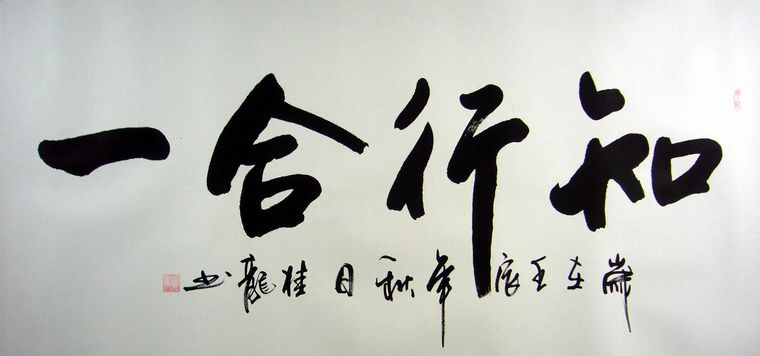13.5 Qualities close to virtue
子曰、剛、毅、木、訥、近仁。
The Master said, ‘The firm, the enduring, the simple, and the modest are near to virtue.’
-> Further to appreciating simple lifestyle, strive to be simple, truthful, and modest towards others and towards ourselves. Not only it helps us develop trust from others, it helps us to develop honesty and truthfulness towards ourselves. We are so used to wearing a “mask” when facing the world, overtime and therefore, we are so disconnected from our inner reality and mistake the task to be ourselves. A simple, direct yet embracing attitude therefore is helpful in recovering our inner and outer reality.
13.6 Qualities of a scholar
子路問曰、何如斯可謂之士矣。子曰、切切、偲偲、怡怡如也、 可謂士矣、朋友切切偲偲、兄弟怡怡。
Zilu asked, saying, ‘What qualities must a man possess to entitle him to be called a scholar?’ The Master said, ‘He must be thus,– earnest, urgent, and bland:– among his friends, earnest and urgent; among his brethren, bland.’
-> truthfulness, directness again emphasized in facing friends and brothers.
15.5 Qualities of a superior man
子曰、君子義以為質、禮以行之、孫以出之、信以成之、君子哉。
The Master said, ‘The superior man in everything considers righteousness to be essential. He performs it according to the rules of propriety. He brings it forth in humility. He completes it with sincerity. This is indeed a superior man.’
-> Here Confucius the whole process of carrying out virture. From spiritual intention (righteousness), to worldly consideration (propriety), to implementation (humbly), to completion (sincerity). This is unique in spiritual education that not only the intention is described, but the whole process of manifestation is guided. It is wisdom of how to be successful as well, as well as how to integrate spiritual intention (internal) with the objective world (external).
* * *
Discussion:
Everyone talks about honesty. I’m telling the truth. I’m innocent, it’s not my fault, i didn’t know why i do that. Are they really the case? Spiritual students need to go beyond superficial honesty, ignorance, excuses, and seek to be really truthful and honest towards others and oneself. It’s not helpful to keep blaming others for what happening inside yourself. Seek to face and accept yourself as who you are. Be honest, honest, and more honest.
Everyone knows what is humility, or to be humble. How often can we hold this attitude in our life? In the mist of habitual individual and collective self-centerness, humility is an antidote. When facing decision points, instead of thinking what is best for me, meditate what is best for all, for the highest good of all. This is the way of a Superior Man, this is the way of self-transcendence.
When you make progress in honesty and humility, it’s time to practice them in the real world. Here brings the wisdom of Confucius teachings. Typical spiritual teachings just emphasis on spiritual intentions, but some awareness of the external world and some human skills are also needed for the intentions to be successfully carried out. Here Confucius describes righteousness (spiritually appropriate), propriety (worldly appropriate), humility (to counter one self), and sincerity (for completion) for ingredients for implementation. What is use of a charity project, for example, if one only has good will (intention), but carry out inappropriately (wrong time/place/scope), inflating one’s self, and without completion due to lack of sincerity and will? This is the power of Confucius life and his teachings.
13.5 真诚
子曰、剛、毅、木、訥、近仁。
-> 除了欣赏简单的生活方式外,我们可以努力成为对他人和对自己,简单,诚实和谦虚的人。它不仅可以帮助我们建立别人的信任,更可帮助我们诚实和真诚的面对自己。我们都习惯戴着“面具”去面对世界,久而久之,我们便以为面具就是我们的真实的自己。因此,一个简单,直接,和包容的态度,能帮助我们认识和恢复我们内在和外在的现实。
13.6 谦逊
子路問曰、何如斯可謂之士矣。子曰、切切、偲偲、怡怡如也、 可謂士矣、朋友切切偲偲、兄弟怡怡。
-> 孔子再度强调面对朋友和兄弟时需要真诚和谦虚。
15.5 贯彻实行
子曰、君子義以為質、禮以行之、孫以出之、信以成之、君子哉。
-> 这里孔子描述实行美德的全过程:从精神的意图(义),世俗的考虑(礼),公平的实施(谦逊),到贯彻的完成(诚意)。在精神的教育中,这是独一无二的,因为孔子不仅描述了意图的重要,更提出了实行美德整个过程中要注意的地方。
* * *
讨论:
人人都在谈论诚实:我说的是实话,我是无辜的,这不是我的错,我不知道为什么我这样做。他们真的是这样吗?心灵学生必须超越肤浅的诚实,无知,和借口,寻求是否真实和诚实地对待他人和自己。不能将自己内部的问题推到他人身上。寻求面对和接受自己,真实的自己。要诚实,诚实,更诚实。
每个人都知道什么是谦卑,要谦虚。 ,我们经常可以在我们的生活中保持这种态度吗?在习惯性的个人和集体自我中心中,谦虚就是一种解药。面对决定的时候,不要思考什么是最适合我的,要想什么是最全部最好的,最善的好。这是君子的方式,也是自我超越的方式。
当你在诚实和谦逊取得进展时,是时候在现实世界中练习。这里便可应用孔子的智慧。一般的精神教义强调精神的意图,但当我们在世界生活时,更需要认识外部的世界和一些做人的技能,才能成功的在现实世界中执行精神的意图。在这里,孔子描述了义(精神上合适的),礼(世俗情况合适的),谦卑(抗衡自我),诚意(完成)作为实施的成分。例如,若要举办一个慈善项目,如果只具有良好的意图,但进行不恰当(错误的时间/地点/范围),引致个人的自我膨胀,由因缺乏诚意,将未完成,这有什么用?
这就是孔子教诲的力量。


Leave a Reply